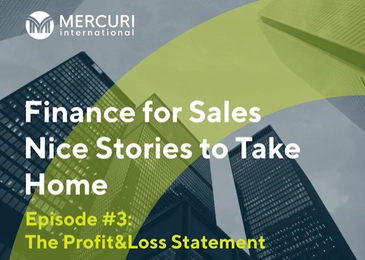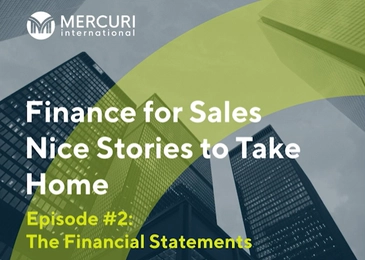As we gather momentum into 2023, it’s time to take a look back at the events of 2022 – and see how they can inform our plans for the rest of 2023. In particular, we’ve now had time to consider and reflect on some key findings from The Sales Conference, Mercuri International’s most recent global event, which was held in November ‘22, and brought together business leaders and some fascinating keynote speakers. Here’s a highlight of what we learned from them and some reflections as to what their insights might mean for 2023.
What’s the big idea?
The theme of the event was ‘trust’. But why?
2022 was a year of rapid and fundamental change, with conditions of increasing uncertainty. The objective rule of law, peaceful transition of power, and territorial sovereignty, were challenged and in some cases overturned. Add that to existing fluctuations in supply chain dynamics and it can be hard to keep up.
So, in this climate, where existing social structures are constantly changing, how do we build meaningful relationships that can help develop long term, sustainable business growth? The answer comes down to trust. Our keynote speakers all weaved the theme of ‘trust’ into their presentations, but each had their own unique perspective and real world experience that they brought to the conversation.
These are the speakers that you’ll meet during the reading, click on their names to read their perspective: Henrik Larsson Broman, Anssi Rantanen, Thimon de Jong, Elin Hauge, Bruce Dickinson
Henrik Larsson Broman
The keynote presentations were kicked off by Henrik Larsson Broman – speaker, researcher, author & trendspotter – who also authored the report ‘The Future State of Trust’.
“Trust has always been a main driver to succeed in business…trusted companies have more loyal customers, lower employee turnover, higher revenue and profitability, and higher market value. Also, higher levels of trust result in lower costs of doing business. Not least because trust makes customers recommend your company. In addition, trust fosters cooperation among colleagues and increases commitment to the organization.”
The Future State of Trust 2022 Report
Henrik’s presentation focused on the key findings of the report, namely that there existed 6 key dimensions to establishing trust:
- Competence
- Purpose
- Security
- Reliability
- Integrity
- Reputation
Those who wish to dive into the findings in detail can download the full copy of the report here, but Henrik’s keynote was so much more than stats and metrics – it established a world view where trust wasn’t just ‘a’ component of successful, sustainable business growth, but was the key component; trust is ‘table stakes’ when it comes to making a business thrive.
“When customers distrust companies, trust also becomes a valuable currency in sales and a way for those companies to differentiate themselves from others…99% of business leaders surveyed say that “trust is critical to building long term relationships with clients”
Henrik Larsson Broman
Anssi Rantanen
With trust being a key building block of long-term sustainable growth, it makes sense that the next speaker to hit the stage was Anssi Rantanen. Over the course of three years at Google he helped over 50 companies implement and execute growth strategies and subsequently leveraged that experience into his current role as a growth marketing expert.
“What I do is study the fastest growing companies in the world, then package that knowledge into courses, and teach those skills and strategies…”
Anssi studies the fastest growing companies in the world and questions why? What is it that these companies have in common that results in growth – and how can we emulate it?
He kicked off his presentation with a quote – “show me your habits and routines and I will show you your future” – suggesting that if we can identify patterns and connections behind these habits, then we can isolate and replicate them. Anssi identified 5 building blocks for the formation of good habits in teams within companies:
- Meaning – do we find the work meaningful?
- Autonomy – can we as individuals contribute to how and when we work?
- Growth – are we given opportunities to learn and grow?
- Impact – does what we do matter?
- Connection – does it form a connection to the real world?
And how does this connect to trust? Well, Anssi viewed the concept of trust from the team building perspective – that when we build these 5 ‘good habits’ into our corporate culture we also begin to build a trusting environment:
“Google found that there’s this thing called ‘psychological safety’ that correlates the most with a team’s success. And psychological safety basically means that every single employee feels safe, psychologically, to come up with ideas, to say what they think, to try things out. If they fail, that’s okay. They’re supported by the team. That’s trust.”
Thimon de Jong
With the psychological element of trust building established, it naturally made sense to turn to Thimon de Jong. Thimon is (among other things) a lecturer in social psychology at Utrecht University and also a founder of Whetston, a strategic foresight think tank that takes an interdisciplinary research approach that combines diverse academic disciplines from a broad range of backgrounds.
In presentations, his particular skill is the way that he blends serious academic credibility with real-world business pragmatism – and manages to make the combination both enlightening and entertaining. In his keynote, Thimon introduced us to the idea of the ‘polycrisis’:
“The state of the world influences how people behave and how they make decisions. What makes this day and age (and the coming years) interesting is that we are hit by one crisis after another – whilst the climate crisis is ongoing. And this ‘polycrisis’ is something we haven’t experienced in recent history and it strongly influences our behaviour.”
So how exactly is the polycrisis relevant to the concept of trust? Well, for one thing, it means that buyers might have different purchasing criteria than they would otherwise have. A polycrisis makes us all more self-aware of mental health and, as a result, we tend to place a higher value on products or services that are perceived to have improved mental well-being at heart:
“We often sell products or services, saying it’s faster, it’s cheaper, it’s more convenient, right? Now you’re not only selling a product experience or service, now you’re selling something that improves the mental well being of the user or the buyer.”
Where this circles back to the main topic of trust is that sense of ‘added value’ that goes into the purchasing decision. If we look again at Henrik Larsson Broman’s keynote, we find that ‘integrity’ is a key pillar of trust building. If we create products or services that are designed with society’s best interests at heart, we are indeed acting with integrity – and (to be cynical) that has real business value.
Elin Hauge
2022 was (in tech terms, at least) very much the year in which AI moved from background to foreground, very much coming into the mainstream with the arrival of ChatGPT in November. It was therefore incredibly relevant to hear from Elin Hauge, futurist and AI expert, who also has a background in mathematics, physics, and business. Where Elin’s choices of topic now look incredibly prescient is when it comes to her discussion of data, sustainability, and security. Take ChatGPT – in essence a probability engine that figures out the most logical next word in a sentence in any given context. The most likely…
So probability therefore means probably being wrong, some of the time. The trick is knowing therefore what is right and wrong.
“The thing is that these algorithms come with a probability. And a probability comes with a probability of being a wrong as well. And we humans make a mess out of it.”
Where this applies to business – and trust – is when we use data to make decisions. It is hard to find a business area that doesn’t claim to be using ‘data-driven decision making’, but the decisions are only going to be as good as the data – or the way that it is interpreted. For us to be able to truly trust the data, we need to start looking at it more objectively. Elin also touched upon cyber-security – another key pillar of Henrik’s presentation:
“There’s a lot of data lying around. This data is very interesting for hackers. And we humans, you leaders, you really need to transition from being Homo Sapiens to Homo Critical. And I think, if you want to really create and keep that trust with your customers, you really need to take care of their data, and make cybersecurity a top leadership priority.”
Bruce Dickinson
The conference’s keynote presentations were concluded by a natural choice for a sales event – the lead singer of Iron Maiden. But it seems Mr Dickinson has been busy outside of his day job, as his various other roles as airline captain, aviation entrepreneur, brewer, motivational speaker, film script writer and international level fencer attest to.
So what did his many experiences lead him to discuss on the topic of ‘trust’? Well, while he touched upon many of his commercial experiences, it was his rock’n’roll persona that was the foundation of his argument – that you need to turn your customers into fans.
“How do you turn your customers into fans? Well, with trust and integrity. Why are all these people standing in a muddy field getting cold and wet? For two or three days? Waiting for a bunch of 60 year olds to come on stage? In unfeasibly tight trousers. Why? Why aren’t they being sensible and watching it on YouTube? Why aren’t they doing it virtually? Why aren’t they doing it on Zoom?”
Bruce’s argument was simple – yes, Iron Maiden is a commercially successful monster, but they got (and stay) that way by building up trust with their ‘customers’. And how do they do that? By not treating them like customers. If your primary motivation is monetization, rather than bringing pleasure to the fan, you’re not going to last long. But give your fans pleasure, and the rest follows naturally.
Making your customers trust you can also be as much about perception as reality, as Bruce explained in his description of his career as a pilot:
“So you know, I got a haircut, because if I turned up the hair down to my waist, and a pair of shorts, to fly you on holiday, you might be a little bit concerned. And actually, it would make absolutely no difference whatsoever to my ability as a pilot…because if you’re a good pilot, you’re a good pilot – but some of it is about trust. And trust is really rather important. Nobody’s gonna get on that airplane, if they don’t trust the pilot, and wearing the uniform, and looking the part is part of that trust. It says to whoever you’re talking to, whoever you’re dealing with, that I respect you, and I respect your expectations. Because when you know people’s expectations, then you can exceed them.”
What does this all mean for ‘23?
So what was the ‘red thread’ that united all these fascinating keynote presentations? Given the diversity of the topics, it might seem hard to find a single unifying factor, but looking back on it now, it seems simple.
The past few years have put some distance between people – between suppliers and buyers, companies and clients, employers and employees. If we’re going to bridge this gap, we’re going to need to find new ways to engage with each other – and the foundation of this process, this ability to overcome all barriers, whether social, technological, or commercial, is going to be trust.
We often think of trust as abstract – an emotional contract with the people around us. But from a business perspective, trust is a tangible asset – one that can be quantified to make informed decisions, build revenue, and ensure long term growth. It doesn’t appear on the balance sheet, but every smart business leader knows its value. So when we look to the rest of 2023, setting quarterly sales goals and team KPIs, maybe we should take a step back and ask ourselves a simple question: How do we make our customers trust us?
For a detailed discussion on trust building and the full results of our survey, why not download the full report – The Future State of Trust – here


